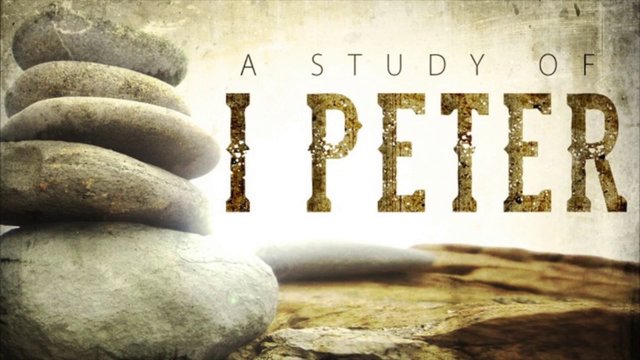Tonight we are discussing 1 Peter 3. The readings tonight contain, in the word of one commentator, “a passage for which it is as difficult to ferret out the original meaning as any of the New Testament.”
Persecution: (vv.13-17)
In the prior verses (vv.8-12), Peter admonishes his audience to have a “unity of spirit, sympathy, love for one another, tender heart, and a humble mind.” v.12. This advice by Peter is not simply ended to show his audience how they should live together, but to tell them how they will endure persecution together. Peter’s advice for a persecuted church is to remind them of Jesus’ final beatitude: “Blessed are those who are persecuted for righteousness’ sake, for theirs is the kingdom of heaven.” Compare, v.14 and Matt. 5:10.
Peter tells his audience that they are not to be disturbed by persecution because persecution will come and it is to be expected. Peter gives them (and us) the threefold way in which to handle any persecution: (i) sanctify Christ in our hearts, (ii) be prepared to give a defense of our faith, and (iii) be gentle and magnanimous.
Whenever we are attacked, the natural reaction is to strike back. But, of course, this is not Jesus’ teaching. Matt. 5:38-48. Therefore, when an attack comes, Peter instructs his audience that they must first hallow or sanctify Christ in their hearts. If Christ is set apart and lifted up in our hearts, then our reaction will necessarily be Christ-like and it will be Christ who speaks through us.
Second, Peter instructs his audience to give a defense (Gk: apologia) for the basis of their hope. If the church is being persecuted for following Jesus, Peter wants them to be ready to explain why? Why do they place their hope in Jesus? This preparation, however, has less to do with preparing a well-crafted speech than having Christ being hallowed in our hearts. For as Jesus promises, those that are his followers are not to be anxious before the authorities “for what you are to say will be given to you in that hour.” Matt. 10:19.
Finally, Peter says that in giving a defense of the hope that is within, we must do so with “gentleness and reverence.” v.16. How we respond to persecution may be more important than the actual words said. In acting with gentleness and reverence in the face of persecution, then, as Peter says, the abusers are put to shame. We can see how this advice plays out both in the early church and, more recently, in the non-violence of the American civil rights movement.
Noah and Baptism: (vv.18-22)
One of the more enigmatic passages of Scripture is found in vv. 18-22. The myriad of interpretations of these verses may be limited only by the number of interpreters. Peter may be referencing the legends in the Book of Enoch (ch. 6-19) which speaks about the evil angels imprisoned at the time of Noah. See, Gen. 6:1-4. This is one of the main topics we looked at in our previous study of Jude.
A more conventional interpretation is that Peter is simply writing about how Christ reverses the curse of Genesis 6 by linking Christian baptism with the story of Noah. This linkage is fairly common. (See, St. Ambrose On the Mysteries (3.10), 1662 BCP, Baptism Rite).
The story of Noah opens with God saying that “My spirit shall not abide in man forever, for he is flesh, but his days shall be [numbered].” Gen. 6:3. Only Noah was righteous, and only through Noah’s righteousness was he and his household saved from the flood. Gen. 6:9, 7:13. Everything else perished in the waters of God’s wrath. Gen. 7:23. The righteous man was saved, the evil perished in the waters of wrath and destruction because they were of the flesh, and God’s spirit left them.
Peter tells us that Jesus reverses the Noah story. No longer are the unrighteous to be destroyed as in the time of Noah. Christ has borne that penalty – the righteous for the unrighteous. In Christ, God also now has died in the flesh (as did those in the time of Noah) but now it is as spirit that God returns to those imprisoned by death. vv. 18-19. Instead of God’s spirit leaving the unrighteous to perish, God, as spirit, returns to a fallen and imprisoned humanity to abide with them and free them from their condition. The condemnation in the time of Noah has been turned into justification for even the condemned have now been freed. In these few verses, Peter reveals to us God’s unconditional love for the ungodly. See, Rom. 5:6.
In this way, when Peter’s audience suffers, they participate in the suffering of Jesus. Jesus suffered to bring eternal life to all, and by their/our suffering and witness so to do they/we participate in Christ’s work of bringing salvation to the world.
Dinner is at 6. The menu is lettuce wraps. Discussion at 6:45. Compline at 8. Hope to see you here!
“For this is like the days of Noah to me:
Isaiah 54:9-10
as I swore that the waters of Noah
should no more go over the earth,
so I have sworn that I will not be angry with you
and will not rebuke you.
For the mountains may depart
and the hills be removed,
but my steadfast love shall not depart from you,
and my covenant of peace shall not be removed,
says the Lord, who has compassion on you.


Pingback: 1 Peter 4 – Flesh and Spirit – Ancient Anglican